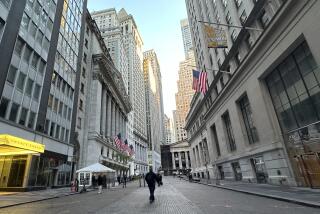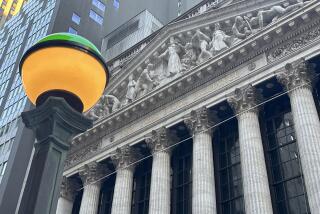Blue Chips Surge; Rates Dip to 18-Month Low
Stocks surged to a new record Wednesday as optimism over the economy and the balanced budget pact drove bonds higher and pushed long-term interest rates to their lowest levels in nearly 18 months.
The dollar rose to a new 2 1/2-month high against the Japanese yen, and gasoline prices rallied to their highest level in six months.
The Dow Jones industrial average jumped 80.36 points to 8,254.89, the third consecutive record for the blue-chip average and its sixth new high in the last seven sessions.
Other major averages also rallied to new highs, with the Nasdaq composite index pushing back into record territory for the first time in two weeks. Rising issues swamped decliners on the New York Stock Exchange as the relatively narrow rally of recent sessions spread to the broader market.
The gains again came on the back of a strong advance in the bond market that pushed interest rates broadly lower. Bonds rallied despite a report that sprinkled some doubt on the slow growth, low-inflation outlook that’s been fueling investor optimism since April.
The Commerce Department reported that new home sales jumped an unexpected 6.1% to 819,000 in June. Strong homes sales can serve as a major economic catalyst, driving demand for an array of building materials and home furnishings.
As the benchmark 30-year Treasury rose, its yield fell to 6.32%, the lowest level since Feb. 16, 1996, from 6.38% on Tuesday.
Analysts said bond traders were able to discount the strong data amid the enthusiasm over the balanced budget deal announced in Washington on Tuesday. The deal would presumably help the bond market by keeping government borrowing, and the supply of Treasury bonds, under control.
“It’s spillover joy that it’s a done deal,” said Robert Froehlich, chief investment strategist for Kemper Funds in Chicago. Wednesday’s data “should have detracted from the optimism. Here you have housing churning on, and the bond market shrugged it off completely.”
But Froehlich and other analysts cautioned that the markets could suffer a setback if Friday’s anxiously awaited reading on July payroll and wage levels, a big influence on inflation, comes in too strong.
Advancing issues outnumbered decliners by a 5-to-2 margin on the New York Stock Exchange in heavy trading.
The Standard & Poor’s 500-stock list rose 10.00 points to 952.29, the NYSE composite index rose 5.14 points to 493.57, and the American Stock Exchange composite index rose 5.12 points to 645.32. All three measures closed at record highs Tuesday.
The technology-rich Nasdaq composite index rose 15.73 points to 1,588.05, beating its previous record finish at 1,580.63 on July 16.
Among Wednesday’s highlights:
* The Dow’s big gainers included J.P. Morgan, up $1.44 to $115.69; IBM, up $3.13 to $106; Procter & Gamble, up $2.75 to $153.13; and Alcoa, up $1.88 to $87.94.
* Computer-related issues were among the market’s best performers.
Micron Technology rose 81 cents to $45.81; Dell Computer rose $1.38 to $82.25; and Compaq Computer rose $1.88 to $55.
Semiconductor bellwether Intel rose $1.25 to $89.38, Motorola jumped $4.25 to $80.88; and Texas Instruments surged $5 to $114.94. Microsoft gained $1.19 to $141.13.
In currency trading, The dollar edged higher versus the yen Wednesday, aided by concern about a weak Japanese economy and fears of renewed tension in U.S.-Japan trade relations. The dollar settled at 118.57 yen in New York, up from 118.43 Tuesday.
At the New York Mercantile Exchange, worries over tightening inventories boosted gasoline prices for August delivery to 69.90 cents a gallon, up 3.43 cents and its highest settlement since Jan. 10.
Overseas, Tokyo’s Nikkei stock average fell 0.9%, Frankfurt’s DAX index rose 0.9% and London’s FTSE-100 rose 1.0%.
More to Read
Inside the business of entertainment
The Wide Shot brings you news, analysis and insights on everything from streaming wars to production — and what it all means for the future.
You may occasionally receive promotional content from the Los Angeles Times.










